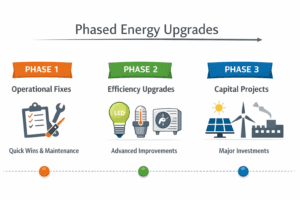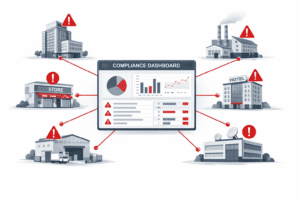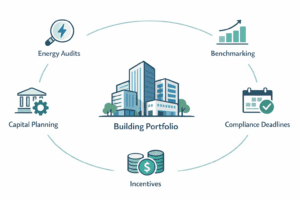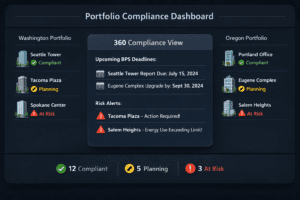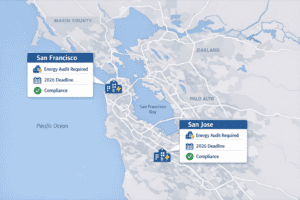I. Introduction
In the vibrant city of San Francisco, known for its iconic Golden Gate Bridge and progressive values, businesses are also recognized for their commitment to environmental sustainability. A key element of this commitment is adherence to San Francisco’s stringent energy audit policies. These policies are not merely regulatory requirements but a reflection of the city’s dedication to reducing its carbon footprint and promoting sustainable business practices. In this blog, we will explore what these energy audits entail, why they matter, and how businesses can ensure they comply with these important standards.
II. The Importance of Energy Conservation

As the world grapples with the challenges of climate change and resource depletion, energy conservation has emerged as a crucial objective for communities globally. For businesses, this is not only a matter of environmental responsibility but also economic sensibility. Reducing energy consumption can significantly decrease utility costs and enhance the operational efficiency of businesses.
In the context of San Francisco, a city that aims to be waste-free by 2030, the role of businesses in energy conservation is particularly impactful. By participating in energy conservation efforts, businesses not only contribute to the city’s environmental goals but also align themselves with consumer expectations, which increasingly favor companies with strong environmental ethics. This shift is evident as more consumers and clients choose to support San Francisco Green Businesses that demonstrate commitment to sustainability.
III. Understanding San Francisco’s Energy Audit Policies
San Francisco’s energy audit policies are a component of the city’s broader commitment to environmental sustainability. These policies require commercial buildings to undergo regular evaluations to identify how energy is used and wasted, providing a blueprint for energy efficiency improvements.
The policies specifically target commercial properties, which are substantial energy consumers. The types of buildings affected include office buildings, retail spaces, hotels, and warehouses, among others. The goal is to ensure that these structures operate at peak energy efficiency, which not only helps the environment but also reduces operational costs for the businesses involved.
IV. Key Compliance Requirements
Compliance with San Francisco’s energy audit policies is mandatory for commercial buildings. The specific requirements include:
– Energy Benchmarking: Buildings must track their energy usage and compare it to similar buildings. This process helps building owners understand their building’s energy performance relative to peers.
– Detailed Energy Audits: Conducted every five years, these audits are comprehensive assessments that identify opportunities to improve energy efficiency. They must be carried out by certified professionals who can provide detailed recommendations for reducing energy consumption.
– Implementation of Recommendations: Post-audit, buildings are required to implement at least some of the recommended improvements, depending on their feasibility and cost-effectiveness.
– Reporting: There is a mandatory reporting component where buildings must submit their energy usage and audit findings to the city. This helps San Francisco track its overall energy efficiency progress.
For detailed guidelines, businesses can visit the San Francisco Department of the Environment website.
V. Consequences of Non-Compliance
Ignoring these regulations can lead to significant consequences. The immediate repercussions include fines and penalties. However, the long-term consequences can be even more severe, affecting a business’s reputation and its bottom line. Non-compliant businesses may face increased scrutiny from city officials and negative perceptions from consumers, which can affect business operations and profitability.
VI. Steps to Ensure Compliance
To avoid these penalties and capitalize on the benefits of energy efficiency, businesses can take several steps:
- Hire Certified Energy Auditors: Professionals with certification understand the specific requirements of San Francisco’s policies and can provide valuable insights.
- Regular Maintenance and Upgrades: Keeping HVAC and other systems in optimal condition can significantly improve a building’s energy efficiency.
- Educate Your Team: Employees can make a big difference in a building’s energy use. Simple actions like turning off lights and optimizing heating and cooling can add up to substantial energy savings.
VII. The Benefits of Compliance

Beyond avoiding penalties, compliance brings several benefits. Economically, businesses can reduce their operational costs through lower utility bills. Environmentally, reducing energy consumption contributes to less strain on resources and lower carbon emissions. Socially, companies recognized for their green initiatives often enjoy enhanced brand loyalty and public support.
VIII. Conclusion
San Francisco’s Energy Audit Policies are more than just legal requirements; they are a testament to the city’s forward-thinking approach to environmental management and sustainability. By complying with these regulations, businesses not only contribute to their city’s green goals but also enhance their operational efficiency and public image.
In conclusion, while the path to compliance might require some investment and effort, the benefits—both immediate and long-term—make it a worthy endeavor for any business operating in San Francisco. Embracing these energy audits can propel a business to new heights of efficiency and corporate responsibility.
VertPro.com offers tools and services to help property owners and managers improve building energy efficiency and meet regulatory standards. Whether you’re looking for instant pricing on energy audits, need support with benchmark compliance, or want to explore available building upgrade options, VertPro provides user-friendly technology solutions to simplify the process. Their platform helps ensure adherence to over 60 Energy Benchmarking and Efficiency Laws across the country.
For those looking to improve their property’s energy usage and operational value, VertPro.com provides a diverse array of tools and information. The site aims to facilitate a better understanding of energy efficiency practices and legislation, helping building owners and property managers make informed decisions about their energy strategies while complying with all energy ordinances and laws.



